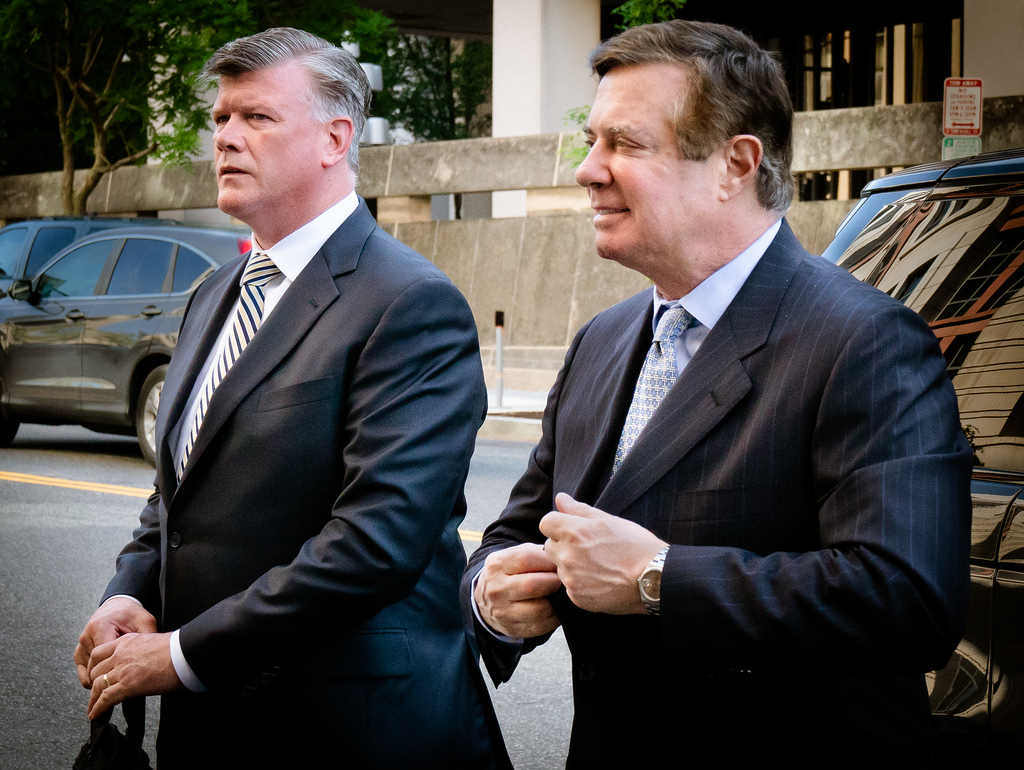Paul Manafort’s Virginia Trial: The Charges and the Stakes for Trump
The trial of Paul Manafort is scheduled to begin Tuesday in the Eastern District of Virginia, five months after Special Counsel Robert Mueller indicted the former chairman of Donald Trump’s presidential campaign for banking and tax-fraud charges related to laundering more than $30 million worth of income. This is the first trial to arise from Mueller’s investigation, and the focus is on financial crimes, some tied to Manafort’s political work in Ukraine dating to 2006.

Published by The Lawfare Institute
in Cooperation With

The trial of Paul Manafort is scheduled to begin Tuesday in the Eastern District of Virginia, five months after Special Counsel Robert Mueller indicted the former chairman of Donald Trump’s presidential campaign for banking and tax-fraud charges related to laundering more than $30 million worth of income. This is the first trial to arise from Mueller’s investigation, and the focus is on financial crimes, some tied to Manafort’s political work in Ukraine dating to 2006. Manafort’s defense team has filed a blizzard of motions in the months leading up to the trial: questioning the special counsel’s authority to pursue charges against Manafort; requesting that the trial be moved from Alexandria to Roanoke; seeking to delay the start of the trial; asking that Manafort be transferred to another detention facility and, after that request was granted, reversing course. Proceedings have been slightly delayed from the original schedule.
What Are the Charges?
This trial concerns only one segment of the charges filed against Manafort.
A superseding indictment filed Feb. 22 in the Eastern District of Virginia charged Manafort and his longtime business associate Richard (Rick) Gates with 32 counts of bank fraud, tax fraud and failure to report foreign bank accounts. Prosecutors allege that beginning as early as 2006, Manafort and Gates disguised millions of dollars’ worth of overseas income stemming from Manafort’s political and lobbying work in Ukraine, where clients included then-President Viktor Yanukovych, Yanukovich’s pro-Russia political party and the party that succeeded Yanukovych’s party after he fled—to Russia—following an uprising in 2014. Funneling millions through accounts in Cyprus, the Seychelles and other locations, the indictment charged, Manafort “used his hidden overseas wealth to enjoy a lavish lifestyle in the United States” that involved spending more than $900,000 on rugs and more than $1 million on clothing for himself.
The February indictment expanded on allegations of money laundering and other charges filed by the special counsel last October, including failure to register as a foreign agent. Charges against Gates were quickly dismissed after he agreed in February to cooperate with the prosecution and pleaded guilty to lying to the FBI and conspiracy to defraud the United States. Gates, who continued working for the Trump campaign in 2016 even after Manafort left and who went on to work on Trump’s inaugural committee, is expected to testify against Manafort.
Why Are There Two Trials?
The October indictment was filed in the U.S. District Court for the District of Columbia, and the superseding indictment was filed in the U.S. District Court for the Eastern District of Virginia. (This Lawfare post by Quinta Jurecic lays out the contents of both indictments.) In a status report also filed Feb. 22, the special counsel’s office noted that it had asked whether Manafort and Gates wanted to waive venue and consolidate the charges into one indictment in one court. When Manafort refused, the special counsel proceeded with the charges in the Eastern District of Virginia. In early June, an additional superseding indictment filed in Washington against Manafort and another associate, Konstantin V. Kilimnik, scaled back the D.C. case to money laundering and failure to register as a foreign agent, with most of the financial charges held over in the Virginia case alone.
Manafort has pleaded not guilty and sought dismissals of both cases, arguing that Mueller was not empowered to charge him with crimes unrelated to his investigation of Russian election interference and that the scope of Mueller’s mandate was too broad. U.S. District Judge Amy Berman Jackson, who is overseeing the case in D.C., refused in May to dismiss the charges. In a 37-page opinion, she called Manafort an “obvious person of interest” in the investigation and wrote that “the indictment falls squarely within that portion of the authority granted to the Special Counsel that Manafort finds unobjectionable: the order to investigate ‘any links and/or coordination between the Russian government and individuals associated with the campaign.’” (That same month, she also denied Manafort’s motion to dismiss charges of making false statements, which he had argued were duplicative.)
U.S. District Judge T.S. Ellis III, who is overseeing the federal case in Virginia, heard arguments in May on Manafort’s motion to throw out the case. He made some comments during the proceedings that were widely reported: “I don't see what relation this indictment has with what the special counsel is authorized to investigate," Ellis said, according to Politico’s account. "‘You don't really care about Mr. Manafort's bank fraud. ... What you really care about is what information Mr. Manafort could give you that would reflect on Mr. Trump or lead to his prosecution or impeachment.’" He also asked why the special counsel’s team was pursuing the financial charges against Manafort but had shifted an investigation of Michael Cohen, Trump’s personal lawyer, to prosecutors in New York, suggesting that both were peripheral to the core investigation.
“We followed the money into the transactions that led to the charges here,” said Michael Dreeben, an expert in criminal appellate law at the Justice Department detailed to Mueller’s team. “We are not going off the range that the acting attorney general authorized us to do.”
Ultimately, Ellis rejected Manafort’s dismissal request in late June. “No interpretive gymnastics are necessary” to determine that the investigation and charges fall within the scope of Mueller’s authority as described in an August 2017 memo from Acting Attorney General Rod Rosenstein, he wrote. The special counsel’s investigation “focused on potential links between defendant and the Russian government. In particular, the Special Counsel investigated defendant’s political consulting work on behalf of, and receipt of substantial payments from, then-President Victor Yanukovych of the Ukraine and the Party of Regions, Yanukovych’s pro-Russian political party.” Yanukovych’s openly pro-Russian politics “warranted the investigation here,” Ellis wrote. “The fact that the Russian government did not make payments to defendant directly is not determinative” given the special counsel’s mandate, the judge wrote.
Other Filings
In early June, Mueller’s office accused Manafort of witness tampering, which he denied. Days later, the special counsel filed a new superseding indictment in Washington against Manafort and Konstantin Kilimnik, a Russian associate and former GRU officer who worked for Manafort in Ukraine: charging both with obstruction of justice and conspiracy to obstruct justice by seeking to influence witnesses. Judge Jackson revoked Manafort’s bail—rulings in both cases had allowed him to remain under house arrest pending trial—and ordered him to jail in mid-June, saying he had “abused the trust” placed in him.
A defense filing in early July noted that Manafort is in solitary confinement up to 23 hours a day. The defense asked that Manafort, who was being held about 90 miles southeast of Washington in Warsaw, Va., be transferred closer to Alexandria, where he will be prosecuted, because traveling two hours each way for meetings hindered preparation for trial. After Judge Ellis granted the transfer, the defense team abruptly reversed course, arguing that Manafort could not safely be housed in the general prison population and requesting that he continue to be held in Northern Neck Regional Jail.
In early July, Manafort sought a continuance of the Virginia trial until the D.C. trial, which is scheduled to begin in September, had concluded. Judge Ellis denied the request. Manafort also sought to move the Virginia trial to Roanoke, about 200 miles away in Virginia’s Western District, saying that news coverage of the proceedings had probably biased the jury pool against him and that the political leanings of Washington-area residents meant he could not get a fair trial. Judge Ellis denied the request July 17, writing that media coverage had not created the “carnival or circus atmosphere” necessary to warrant moving the proceedings. He also wrote that Northern Virginia covered a large geographic area, with a population of about 3 million, and that the defendant’s argument about potential jurors’ political leanings failed to account for conservative or Republican-leaning areas.
On Monday, the evening before the trial was scheduled to open, Manafort dropped his appeal of a civil case, filed in D.C. in January, challenging Mueller’s authority to bring a case against him. Manafort initially sought to dismiss the October indictment and eventually narrowed the demand to an order precluding future investigative steps. Judge Jackson had dismissed the case in April, partly because the focus was too speculative.
What Are the Ties to the President?
The charges in the Virginia case do not allege that the Trump campaign colluded with the Russian government in 2016; actually, they have nothing to do with collusion or campaign activity. Prosecutors have said they would not explore such potential collusion in the Virginia case, and Judge Ellis warned last week that “collusion” and “Russians” should not be mentioned. Still, the verdict stands to have an impact on perceptions of an investigation the president has repeatedly described as a “witch hunt.” A conviction would make it harder for Trump to credibly claim that the special counsel’s inquiry is unfounded. Acquittal, conversely, would probably strengthen calls to end the investigation.
Manafort’s former employer, the nation’s tweeter-in-chief, has followed the proceedings. The same day in May that Judge Ellis asked about the special counsel’s scope during the dismissal hearing, President Trump noted the judge’s questions and publicly praised Ellis as a “highly respected” judge and “really something special, I hear.” When Manafort was ordered to jail in June, Trump tweeted (incorrectly describing the revocation of Manafort’s bail as a sentencing): “Wow, what a tough sentence for Paul Manafort … Very unfair!” Trump told reporters that day that the charges against Manafort had “nothing to do with our campaign. But … I feel a little badly about it. They went back 12 years to get things that he did 12 years ago.”
Judge Ellis noted in March that if convicted Manafort, who is 69, “faces the very real possibility of spending the rest of his life in prison.” For months, it has been unclear whether Manafort would actually go to trial. Two trials at that. Is he gambling that prosecutors cannot get a conviction, despite the apparent weight of the evidence against him? Or is he hoping, ultimately, that no matter how the trial goes, the president will pardon his former campaign chairman?



.jpg?sfvrsn=676ddf0d_7)

